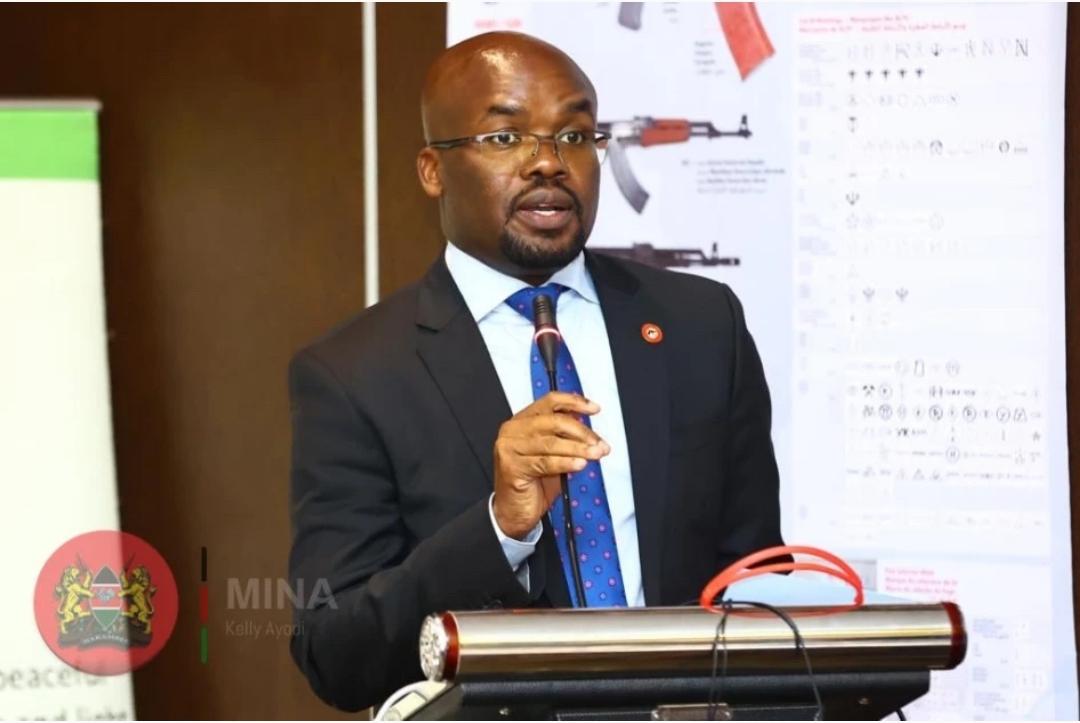
The Government of Kenya is currently engaging with Ethiopia, South Sudan and Somalia in a bid to mitigate cases of cross-border smuggling of illegal firearms, Interior Principal Secretary (PS) Dr. Raymond Omollo has revealed.
Speaking in Nairobi during the opening ceremony of a three-day workshop organized by the Regional Centre on Small Arms and Light Weapons (RECSA), Omollo noted that the illegal firearms need to be reined in since they have inflamed conflicts between border and nomadic communities in the North Rift, northern frontier counties and parts of Eastern Kenya regions.
“Due to their easy availability and low cost, these are the weapons of choice for terrorists, insurgents, and criminal gangs in the Great Lakes Region and the Horn of Africa,” he said.
“Unsurprisingly, these regions cumulatively account for approximately 30 percent of all the small arms and light weapons in the country, a trend that has hindered progress towards social and economic development.”
In a bid to counter new ways that illegal firearms smugglers are using to bypass border security, Omollo also revealed that Kenya has committed to establishing a robust border control system, which will feature next-level surveillance technology.
“Those of us in the security sector can attest to the complexity of these criminals’ methods and the extension of their networks,” the PS noted.
“This move will help us conduct surveillance and respond to illegal crossing and movement of proscribed goods, including dangerous weapons.”
The aforementioned workshop brought together various local, regional, and international law enforcement agencies, and the discourse will revolve around enhancing the SALW marking, record-keeping and tracing regime.
The Kenya National Focal Point (KNFP), which is also represented at the workshop, described diversion as “loss, theft, leakage and proliferation” of weapons, and prescribes efficient security of arms and ammunition stockpiles.
Through its representative, the agency stated: “The systematic control of stockpiles is in keeping with a philosophy of ‘due care’ and therefore States should take a proactive, rather than re-active, stance in ensuring that arms are accounted for and secured to the highest standards.”
According to the Eastern Africa Police Chiefs Cooperation Organization/Counter-Terrorism Centre of Excellence (EAPCCO-CTCoE), which is also among the agencies represented in the workshop, the most notorious weapons used by terrorists, bandits and armed gangsters include the Kalashnikov rifle (AK47), colt M16, H&K G3 rifle, PKM machinegun and RPG7.
“All these weapons have serial numbers and can be easily traced to manufacturers if governments were to take this menace seriously,” stated the Deputy Director, Gideon Kibunjah.
Interpol, through its representative, vouched for the effectiveness of its I-24/7 global police communications system, which enables police around the world to share alerts, data and intelligence on various security issues.
The agency further undertook to remain a committed partner in the quest to improve cooperation on international cases and efforts to tackle transnational organized crimes.
Other agencies involved in the training include: Germany’s Bonn International Center for Conversion (BICC), the African Union Commission (AUC), the Regional Economic Communities, and the International Conference on the Great Lakes (ICGLR) among others.
𝗦𝗲𝗺𝗮𝘀𝗼𝗰𝗶𝗮𝗹 𝗶𝘀 𝘄𝗵𝗲𝗿𝗲 𝗿𝗲𝗮𝗹 𝗽𝗲𝗼𝗽𝗹𝗲 𝗰𝗼𝗻𝗻𝗲𝗰𝘁, 𝗴𝗿𝗼𝘄, 𝗮𝗻𝗱 𝗯𝗲𝗹𝗼𝗻𝗴. We’re more than just a social platform — from jobs and blogs to events and daily chats, we bring people and ideas together in one simple, meaningful space.